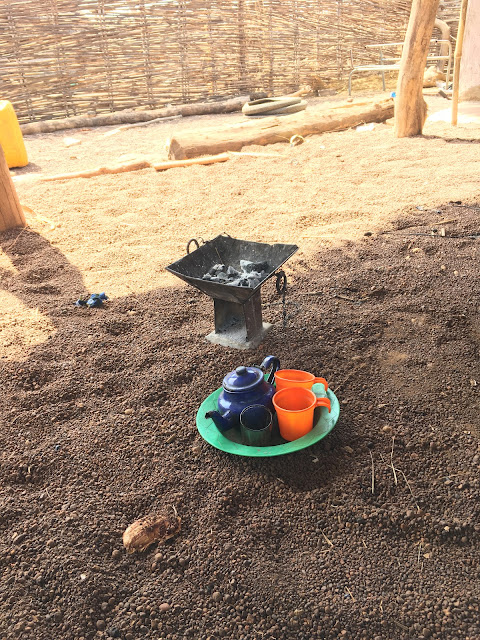Kamo Takes a Drink
N.B.
Kalabante = jokester, trickster, troublemaker (used among friends in a loving fashion)
It is noon, three hours after today’s rays of direct sunlight have become unbearable for more than five minutes. I am sitting under the disintegrating shade structure in front of Baba’s hut as he prepares attaya. One of the six posts—which used to be living trees in the nearby bush—holding up the bamboo-and-straw roof is listing slightly toward the center of the yard, and another is leaning twice as much. Baba attributes the problem to termites chewing up the underground portions of the posts. The former trees are no longer stable in their new jobs. “I’ll fix it,” he says, though we both know this means “I’ll fix it when it falls down.”
I reposition my chair, itself made from the wood of a palm-like tree gathered from the seasonal river that flows by my village, so as to dodge the new shaft of sunlight piercing through the patchy straw above me. There is no sense in replacing the shade-creating straw before replacing the posts, and the posts will not be replaced until the whole structure collapses. We are trapped in a Catch-22 of inaction. So I shuffle my chair to the new location of the moving patch of shade, creating deep lines in the dusty gravel of the yard and exposing the underlying red dirt.
The bitter smell of Baba’s boiling green tea makes my stomach rumble. My body has quickly become accustomed to a noontime shot of caffeine and sugar. Preferably ingested on an empty stomach, before lunch is served. I close my eyes, lean back and rest my head on the hard back of the chair, wishing it were soft. I lean my head slightly to the right so as to avoid pressing the back of my skull against the top plank, which protrudes slightly. A warm breeze moves the hairs on my bare arms but does not cool them. Baba has just added sugar to the teapot, and the evaporating steam wafts my direction. My stomach grumbles, angrier than before.
Kamo, my namesake’s youngest son, comes running into the yard. The dance of a child who does not yet have complete control of his body, a child at play. He is barefoot and pantless, as usual. His plain green T-shirt does not quite cover his protruding 2-year-old belly. Kamo’s baby-sized reproductive organs bounce slightly as he traverses the yard, shrieking in delight. Every part of his exposed skin is caked in red dust. Tonight he will scream as his mother scrubs his short hair to get the dirt out from his scalp.
“Water!” he says when he reaches the outdoor bed—made from the same tree as my chair—where Baba is once again reclining on one elbow and staring out at the yard. He is reheating the tea in preparation for serving the first round. Baba slowly swings his feet to the floor and walks into his hut. Kamo follows eagerly. A few more months and Baba will be ordering Kamo to go bring him water from the clay pot in his room, but for now Kamo cannot be trusted to carry a full cup of water inside a hut without spilling. Thus, the old serves the young.
Baba emerges from his hut carrying a lime green plastic one-liter cup in front of him, ducking as he passes under the five-foot-tall door frame. Kamo holds out his hands for the cup as he trails Baba to the bed. Baba sits down slowly and hands the cup to Kamo, saying “drink.” Kamo takes a step into the sun and holds the cup with a hand on either side. Those who grow up here have partial immunity to the sun’s heat. Young kids especially do not seem to be bothered by the sun. The cup is bigger than Kamo’s face and is likely the heaviest thing he lifts on an average day of playing in the yard. He raises it to his lips and begins to drink, imitating his elders. Senegalese men do not often drink water, but when they do they down a liter at a time in a few giant gulps. Kamo chugs, and we watch him drink. His stomach rhythmically grows a little larger with each swallow. A trickle of water runs down his chin and onto his shirt, the dark green stain growing wider as the liquid soaks into the dirty fabric.
A sound begins, a stream of water falling onto rocks. Kamo, the bright cup still obscuring his face from my view, has let loose a stream of urine onto the gravel in the center of the yard. He drinks and he pees. Baba takes a break from pouring our tea and watches, smiling. The stream is steady and strong. My stomach has stopped thinking about the tea; I am fully occupied by watching Kamo. I love that Baba is enjoying the show, too. Kamo’s pee slowly dribbles away to nothing. He continues to drink.
Kamo brings the cup down from his mouth and exhales deeply through his nose. His mouth still holds one last gulp of water that he does not yet have room to swallow. He waddles over to the bed and holds the cup out to Baba with a “hmm!” Baba places the cup, now half empty, on the ground next to his cigarettes and lighter. Kamo wanders away to find something on the ground to play with.
Baba hands me a shot glass of tea and I sip it. “Kamo,” he says, chuckling, “kalabante.”





Comments
Post a Comment